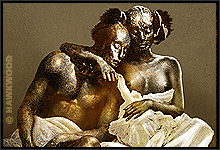You are sitting at your computer innocently doing what you do, when suddenly a formal-looking warning pops up in an on-screen window. It earnestly advises you that your comp has been infected with a virus, and that you absolutely and beyond question need to let it do a system scan to help you rid your hard drive of the offending corruption before things go into digital meltdown. Before you have a chance to decide, it begins a rapid scan, and on completion delivers an alarmingly specific list of the assorted bugs which it has detected that are even now busily chomping their way through your files. All you need to do (it suggests) is make over a payment to the scan company and your embattled hard drive will be restored to its former pristine condition.
Those who have had the above bad experience (and those who suss it anyway) will know that it is the helpful scan (in reality a mere animation) that is attempting to use fear to con you into parting with your cash. And that convincing list of threatening bugs is a fake: not one of them actually exists. In fact, there was nothing wrong with your system in the first place. Well.. not until the fake scan began, anyway.
Supposing it has been suggested to you that you have a 'virus' in your system – in yourself. Through constant reiteration of this idea to you, you no longer even question its veracity - to the point where you accept your virus-ridden condition as the only reality. It seems like a gloomy prognosis. Mind you, there is no actual straight evidence for the existence of this virus, and (if you're honest with yourself) neither do you notice any direct ill-effects from the damage being done to you internally. You simply accept that you are the unconsenting host to this bug, and that’s the way things are.
But wait! You are told that there is hope. There is a way to get rid of your virus. There is a way that you can be 'debugged', and it is so very, very easy. Remembering that you are long past the point where you question the reality of having such a virus inside you, you'd grab at the chance, right? And one factor that would make you reach out for what's on offer is simple fear: fear at the thought of what might happen if you don't, as it were, make over the cash. Now for ‘virus’ read ‘original sin’, and for ‘debugged’ read ‘redeemed’, and my metaphor is complete. Voila!
This is the mental (and emotional) sleight-of-hand that is part and parcel of faith. You have been convinced of the reality of the sin inside you, and that you absolutely and beyond question need the ‘cure’ of redemption. But since this blog is partly about questioning the unquestioned... what if there is no ‘sin’? What if there actually is nothing wrong with you in the first place? Religions and beliefs by no means universally recognize the concept, and it goes without saying that for unbelievers it’s a non-starter. Sin is a product of the human mind: an idea which, I know from personal experience, can be shocking to those for whom it is a tenet of faith.
And if you already have accepted Jesus, then you must buy into sin as well, because without sin to redeem, Jesus’ ministry would have no purpose. It’s a closed loop, and once you’re in it, you will probably have a fight on your hands to break out of it, even when you perceive the mechanisms which keep the wheels of faith turning. It’s a fight, because of the various pressures which can be brought to bear upon you; from family, from friends, from social and community situations in which you might have involved yourself over a period of years. You might have so much invested in the situation which comes with your faith, emotionally and socially, that you will deny your own doubts to yourself, even when confronted with those doubts. I’ve seen it happen often enough.
But few words are more true or more wise than those attributed to Jesus in the heretical 2nd-century Gospel of Thomas: ‘If you bring forth what is within you, what you bring forth will save you. If you do not bring forth what is within you, what is within you will destroy you.’ These are the words of a very different Jesus from the Jesus propounded by Bible-thumping cable network evangelists. This is an altogether more intriguing Jesus, a quietly-spoken Jesus whose voice has been silenced by orthodoxy, a Jesus the Zen master, a Jesus the shaman, a Jesus the mystic who, cut loose from all doctrines and dogmas, invites us to coax out any truth which is there for ourselves. And such an intimate and personally experienced truth has no need to invoke any scary soul-chomping bugs.
HawkwoodOriginal bug graphics created with Mehdi and Chaoscope software (scroll upscreen to see the bugs 'walk'!).

















































































Thank you, David - your post about bugs is a very insightful one which hopefully might open some eyes to the truth of how 'bugged' they are!
ReplyDeleteThank you for your comment, Emma. I am persuaded that those religious beliefs which include the concept of sin also use guilt (and I don't think this is saying it too strongly) to prey upon the emotions. Guilt is such a negative emotion, and if one can be persuaded that one carries this burden called 'original sin', then (as I mention in this post) one is grateful for the 'cure' that is on offer. But it seems that, as soon as some sort of religious belief is in the picture, so many are willing to swallow a 'sales pitch' that in other circumstances they wouldn't swallow from a street corner huckster. Someone who told them: 'You're sick and I've got the cure' would get a pretty dusty answer!
ReplyDeleteThank you - and I agree that religious belief seems to change the way people think about things. It somehow almost stops people thinking rationally! But if one doesn't accept that sin exists, how are moral choices made?
ReplyDeleteEmma, I think that sin is so often confused with innate moral values, which might, but need not have, something to do with religious belief as such. In the past I have been asked: 'Well, if you don't believe in sin, how do you know what is right or wrong? Where's your moral compass?' - which only confirms how scarily reliant someone has made themselves on their religious beliefs. 'Do unto others as you would have them do unto you' is a phrase worthy of emulation - and it can be found in several of the world's religious and humanist teachings, including the Analects of Confucius, which predates the New Testament's Gospel of Matthew text by several centuries.
ReplyDelete